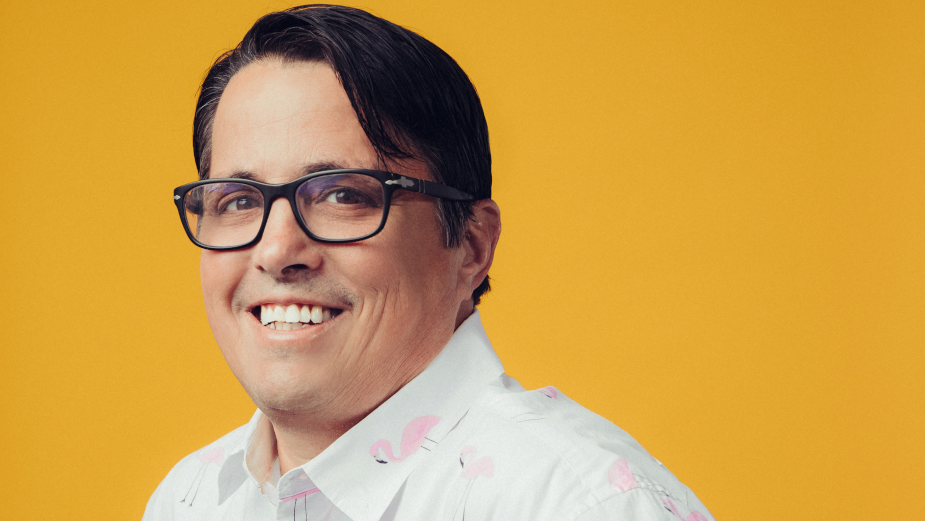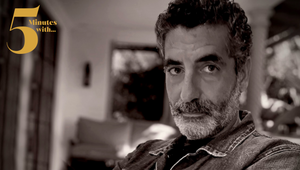
Meet Your Makers: Embracing the Process with Greg Jones

LA native Greg Jones is a veteran commercial and music video producer who was hooked right from his first very tough first PA job: driving Heather Graham around on the set of Lenny Kravitz’s 'American Woman.'
After producing hundreds of music videos for all the top artists of the mid aughts, Greg transitioned to line producing and executive producing hundreds of national campaigns for all the major corporations from Apple, to Visa, to Google and dozens more. His work has taken home everything from Cannes Lions to Emmys to Clios. But the accolade he’s most proud of came from a Billy Eilish/Beats commercial: he got a 'Cool' acknowledgment from his two teenage daughters.
When Greg isn’t working, he's annoying his wife of 22 years who he met on the set of an R Kelly music video.
LBB> What first attracted you to production - and has it been an industry you’ve always worked on or did you come to it from another area?
Greg> I ended up in production completely by accident. I was miserable at a desk job, so I started bartending. My roommate at the time was a production manager and was worried I wouldn’t be able to make rent. So he hired me as a PA strictly to make sure my half of the rent got paid. The first job I ever did was walking on the set of the Lenny Kravitz video ‘American Woman,’ which was three (20 hour) days in the desert. 100s of extras. Blaring music. It was madness, and I was hooked.
LBB> What was your first role in the production world and how did this experience influence how you think about production and how you grew your career?
Greg> I was a production assistant. I worked my way up from the bottom – PA, Coord, PM, line producer. The best advice I ever got was way back at the start from Paul Mannix. He said, “we’re all PAs… just at different rates.” That kinda always stuck with me. A director told me once that he knows we're really in it when the producer is picking up sandbags. I guess I was never too big to pick up sandbags.
LBB> How did you learn to be a producer?
Greg> I had great mentors, and I paid attention. You always take a little away from your bosses about what worked and implement what you think would work better. I would absolutely not be here today without help from people like Kate Sutherland, Catherine Finkenstaedt, Steve Fredriksz, Diana Vance (RIP), Mary Ann Tanedo, and Aesli Grandi.
LBB> Looking back to the beginning of your career, can you tell us about a production you were involved in where you really had to dig deep and that really helped you to grow as a producer?
Greg> I learned early on that being right or 'winning' doesn’t always equate to a long term victory. It’s so much about the process and how to get there. A line producer can have two of three things go absolutely perfectly and still not get asked back. The director could love you, the project comes in under budget, but maybe the agency producer didn't like you. Or the agency producer loved you, the director loved you, and the job went off the rails financially and the production company hates you. Or the agency producer loves loves you, the job does well financially, but the director doesn’t click with you. Ultimately you can control your own actions but you can't control how other people feel, and you'll be much happier if you make peace with that.
LBB> A good producer should be able to produce for any medium, from film to events to digital experience. Do you agree or disagree with this statement? Why/why not?
Greg> Regardless of what you are producing, I think a lot of the same skills come into play. Being level-headed, resourceful, pragmatic, creative. There’s an egolessness to producing, because you have to be very comfortable with the focus being outside of yourself – and fully committed to delivering quality work and a great experience.
I have always joked that producers could run the world quite well if given the chance. But if I’m honest I don't think I’m really joking. I think I might believe it.
LBB> What’s your favourite thing about production and why?
Greg> We’re primarily a comedy house at Ruckus. I feel so lucky that my job is to assist in making people laugh. So many different people coming together and then going our separate ways. I get melancholy at the end of long shoots, a kinda ‘last day of school’ feeling.
I honestly love my job. Every day is different. Production has taken a kid from Compton to 24 countries and every continent on the planet (except Antarctica so I’m counting Tierra Del Fuego). I could have never survived a desk job. And this way, there is someone new every day that hasn’t heard one of my Dad jokes.
LBB> How has production changed since you started your career?
Greg> Crews are getting more diverse which is amazing. Women are in charge. I used to PA for Peggy Sirtoa when she was really the only female director in town. There are so many more mediums now, and digital cameras are sick. I’ve shot stuff that aired on TV before the wrap got turned in.
It’s a much more rewarding and interesting job now I think. You have to be nimble and imaginative to pull off great creative no matter the price point. I always say yes to cool work no matter the budget. It's not always what you will make on a particular project, it's about the people you will meet, the connections, and making something great. We try and carry that over at Ruckus - if the director is into it, we figure it out.
LBB> And what has stayed the same?
Greg> I mean as a producer it’s still people management at its core. Juggling expectations about what’s achievable. Listening to crew members complain about a free catered meal…
LBB> What do you think is the key to being an effective producer - and is it something that’s innate or something that can be learned?
Greg> It’s totally learned. I mean you have a job that every single person on the crew thinks they can do better. It’s all about managing people. A producer told me when I was a PM that 'everyone has their own agenda' and that's so true. The trick is to get everyone on the same page as much as possible, make everyone feel heard, and get their needs met as much as possible.
LBB> Which production project from across your career are you most proud of and why?
Greg> The Geico 'Win-Win' spots for sure. Lots of moving pieces and complex rigging. Six completely different spots in six days that all required their own builds with SFX and VFX. It was a super rewarding challenge, they came out great and everyone left happy.
LBB> And in terms of recent work, which projects have you found to be particularly exciting or have presented particularly interesting production challenges?
Greg> We just did a great Logitech project. We shot in Poland with a company that moved over from Kiev. We were among the first American companies to shoot there since the conflict started. Lots of moving pieces, five set builds, tons of practical effects and transitions. Everyone left really happy and the crews were so energised to be back at their craft.
LBB> Producers always have the best stories. What’s the hairiest / most insane situation you’ve found yourself in and how did you work your way out of it?
Greg> Awwww man, the options here are endless...Snoop Dogg being 13 hours late to his own video. Paramount trying to kick DMX off the lot on his own video for drag racing on the lot with his boys. The whole crew walked off an LL Cool J video because that was the job where video crews demanded to be union.
The location manager telling me two days before we shot and after everything was locked in that we couldn’t shoot our Santa Monica Park on weekends. It would have been a disaster so I didn't tell anyone and just went for it thinking: “who is gonna be at the park on a Sunday Am?” Well, as soon as we rolled there was an angry Ranger waiting. Suddenly there were 100 sets of eyes on me. So I pulled out my permit from the beach the day before and showed it to the guy. He looked at it, handed it back and left us alone for the rest of the day.
Oh yea, I also got arrested and thrown in jail because our location manager gave a site rep the wrong call time and we had to cut a lock to get into the Bat Cave at Griffith Park. I refused to tell the Ranger which PA cut the lock so he arrested me. I guess I would have done well in the mafia.
LBB> What are your personal ambitions or aspirations as a producer?
Greg> They’ve definitely changed a lot over the years. When I started, it was to move up from PA to asst coord to coord to PM to producer. After I became a working Line Producer, it was longevity. 20 years of 20 day months after that, it was to help ensure the people who entrust me with their careers are successful. I like the mico level stuff of figuring out a way to make the money work for the creative and the macro level of giving the director all the tools and guidance to elevate their work. So they can have the sort of creative impact on the business that they dream of.
LBB> As a producer your brain must have a never ending "to do" list. How do you switch off? What do you do to relax?
Greg> Sleep with one eye open.
LBB> Producers are problem solvers. What personally fuels your curiosity and drive?
Greg> Hearing wrap called with everything on the rails and everyone happy enough they want to go grab a drink at the end. Not always as simple as it sounds.
LBB> What advice would you give to people who are interested in becoming a producer?
Greg> Check your ego. Never make the same mistake twice, and just produce...People will almost always see you as who you were when they met you. It’s better to be seen as a producer of something: I produced dozens of music videos at a time when no one wanted to touch them. But the skills I honed there paved the way to commercials.
LBB> From your experience what are the ingredients for a successful production?
Greg> Everyone needs to be constantly updated, expectations managed, and kept on the same page. Surprises are always bad. Underpromise, overdeliver.
LBB> What’s the key to a successful production-client relationship?
Greg> Be a partner. It’s way more valuable than being ‘right’ about something or haggling over money. An extra dollar might be a short term win but it doesn’t come close to the value of a lasting creative relationship.
LBB> One specifically for EPs: Producers are naturally hands on - they have to be. How do you balance that in the more managerial role of an EP?
Greg> More than anything, I hated being micro-managed as a line producer. I try to let the agency producer know that I’m always present and engaged but the line producer is the lead. At the same time, I’m very supportive behind the scenes and set all my producers up to win. And of course I’ll step in when there is a situation that requires a higher level intervention. My door is always open.













